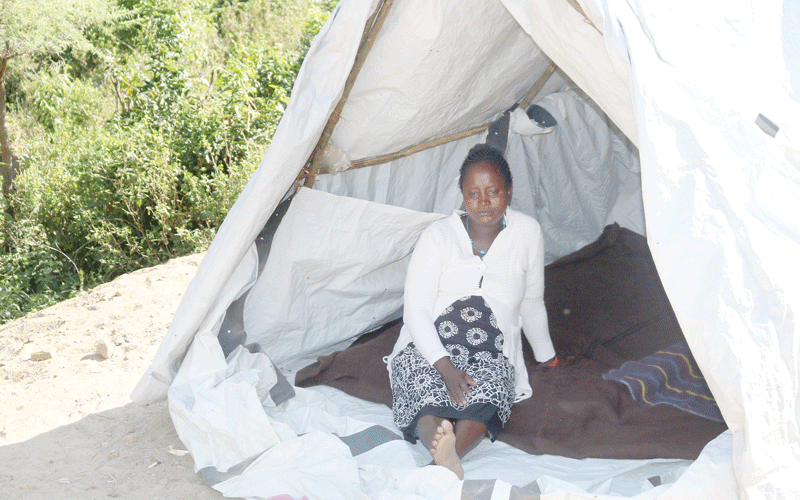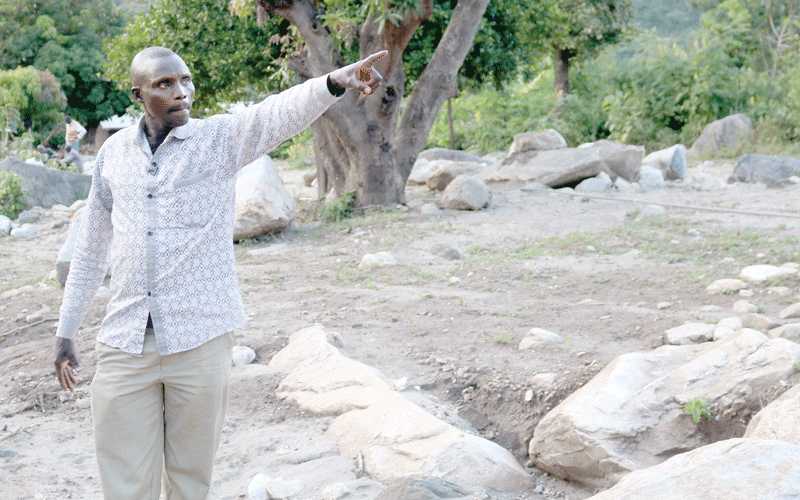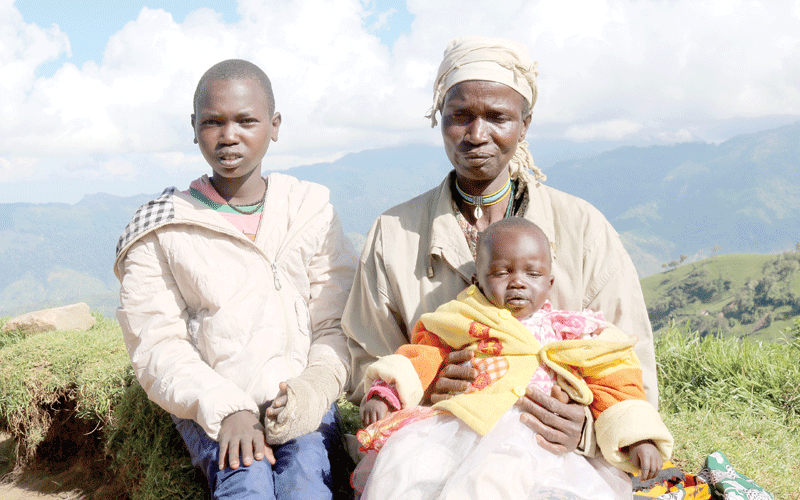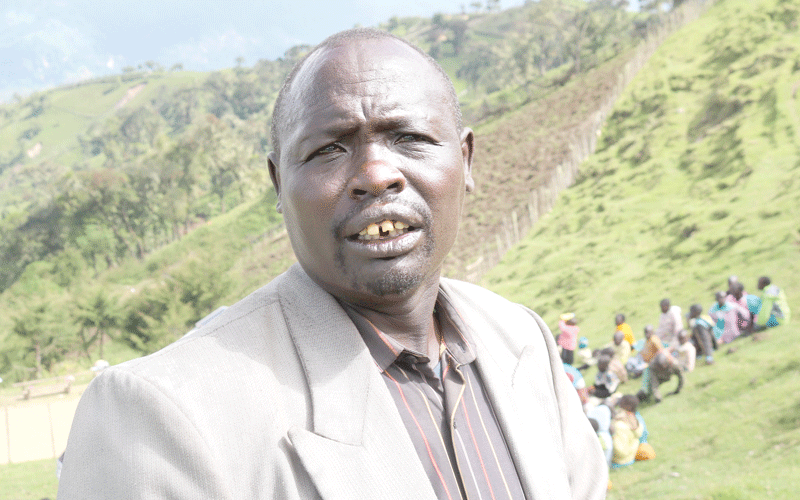Picking up the pieces after West Pokot landslide
By Manuel Ntoyai, January 17, 2020
Survivors of last November landslides in West Pokot are slowly picking up the pieces following the displacement by the raging floods.
Events of November 22, are still fresh in the memory of the haunted residents of Muimo and Nyarkulian village, who were the most affected.
However, their biggest concern now is how to, and whether they can, regain a sense of normalcy.
Kipel Yaranyang, 46, who lost seven children in the landslide, wakes up everyday to go to the spot where his house once stood.
His family was among 332 residents who were affected by the landslide.
“My wife and I were attending a fundraiser at a neighbour’s home and in the evening it started raining. We could not leave until midnight because of the downpour.
When we got home, we could not see our homestead it had been swept away. My children had been sleeping in one of the houses and my cows were in the shed.
All I could see in the rain were floods, debris and rocks hurtling downstream. I thought I was having a nightmare,” recalls Kipel.

After the government ordered that all displaced families move from schools to allow for opening of the facilities, Kipel was forced to pitch tent at his uncle’s house.
“ I can’t sleep at night. All I think are my children. The thought that I haven’t buried any of them still haunts me. How can you then talk about resettling us back in this area?” he posed.
West Pokot Governor John Lonyangapuo and the Kenya Red Cross have set up a Sh30 million kitty to help build homes for the victims.
“It has been a challenging time for my people and also my government. We are still working on resettling some of the victims.
I understand there are emerging issues which we are working to resolve, but first we had to make sure that all school going children are not affected.
I still appeal to the President and other well wishers to help,” says Governor Lonyangapuo.
However, Kipel says building the houses will not help them, as some do not have the land, while others do not want to go back to the land.
They hope some of the Sh5.2 billion the government set aside on Tuesday to support Kenyans affected by the recent floods and fight the locust invasion will go towards buying them land somewhere else.
Resettle somewhere
“Sleeping in the cold when you had a home is painful. I had build my home and now I am camping at someone’s compound.

I thank God Kenya Red Cross offered some bit of counseling during the time they were here, but still, I can’t even think of going back.
I have never and will never step my foot on that piece of land again. The government should resettle us somewhere else,” says Kipel’s wife, Josephine.
For William Domokira, 32, life will never be the same again. He lost two children in the floods. He had also attended the fundraiser with Kipel, but had returned home early and retired to bed.
When he woke up, he found himself surrounded by water, floating downstream. He lost his two children and his wife.
“ I don’t know where to start. I can’t stay here because the memories are still fresh. When we asked about the plans they have for us, they said they will build us homes but we no longer have land to build our houses on.
Our children need to go to school, they need to eat, but now there’s little we can do. My wife is yet to talk to anyone about the incident. She is still trapped in that moment,” he says.
Less than 5 kilometres away, across the valley in Nyarkulian village, Naomi Cheporiot, 14, who is a Class Five pupil at Nyarkulian Primary School, life has changed.
Having lost her mother and a sibling in the landslides, she was saved from the debris, but suffered broken limbs.
Her infant sister, Lucy Chepchumba miraculously survived the ordeal. She was strapped on her mother’s back for more than an hour, buried in the debris.

They are now living with their grandparents and aunt Palion Lochalem.
“ I lost my daughter that night and now I have to take care of her two surviving children.
Their father, who was badly injured in the landslide, is still in hospital. The little one needs baby food and all I can feed her is porridge.
If I still had my potatoes and cows, I could do better but now look at my state? I am just another pauper struggling,” says Lokapel Lochalem, Naomi’s grandfather.
For farmers and businessmen, transporting their produce from their farms to the towns has been a gruelling affair.
While some lost their relatives, most lost their lands, cattle and other possessions.
“ We are looking at a hunger crisis because our farms were swept away. We no longer have good roads to even transport the little we have and even transporting goods from Kapenguria to the villages to restock has been challenging,” says Rose Katina, a trader and farmer at Nyarkulian Shopping Centre.
Benson Mukelima, 23, and a father of two, whose house was almost swept by the landslides says that there is need for a reassessment of the number of people to be compensated.
He says that Kenya Red Cross has only insisted on building houses that were completely destroyed, leaving those with homes that were partially destroyed in a limbo.
Destroyed projects
Families that did not get relatives to accommodate them have found shelter at a local Dini ya Msambwa Church.

“ We have women and children sleeping on the cold floors. The men have to sleep in the tent together. Kenya Red Cross helped our people with counseling and we also had doctors camping here for a number of days.
However, since they have all left, we are now in the hands of the local dispensary which does not have enough staff,” says Joseph Nguriasarich, chairman of the Nyarkulian victims committee.
He says they need drugs and food supplies because the last time they got any assistance was before Christmas.
While he recognises the roles played by both levels of governments, he says they are afraid of more floods.
“ We are sitting on a time bomb here. We have already mapped out some of the places where they could be affected anytime and I am calling on the government to think about settling some of us somewhere else,” he says.
The landslide did not only affect homes, it also destroyed projects that were the lifeline of the region.
The Kerio Valley Development Authority (KVDA) estimates that it will require Sh300 million to rehabilitate the three irrigation schemes in Central Pokot affected by the heavy rains.
KVDA acting managing director Sammy Naporos says the money is required to repair water canals and intake systems for the three Weiwei, Tukou Sangat and Marich Pass projects that support more than 20,000 families.